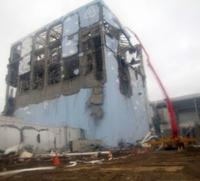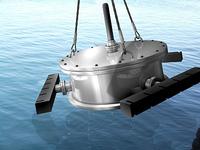-
Wireless sensors effective in protecting critical infrastructure
A key to critical infrastructure security is effective monitoring of such infrastructure; a European research project has now successfully demonstrated a wireless sensor-based solution for cost-effective monitoring of electricity distribution networks and water networks
-
-
Predators may have contributed to 2007 Wall Street collapse
A new study retraces events to show that at a critical point in the financial crisis, the stock of Citigroup was attacked by traders by selling borrowed stock (short-selling) which may have caused others to sell in panic; the subsequent price drop enabled the attackers to buy the stock back at a much lower price
-
-
Fukushima reaches cold shutdown conditions, critics scoff

Last week Japanese officials declared that the beleaguered Fukushima Daiichi power plant had become stable enough for engineers to complete a “cold shutdown”; officials also stated that the facility had ceased to leak substantial amounts of radiation, a claim received skeptically by critics
-
-
Building earthquake-proof buildings
Researchers in Australia are leading an international project to help identify buildings most vulnerable to earthquakes and the best ways to strengthen them
-
-
Improving pothole repairs
The alarming increase in the number of road potholes in the United Kingdom — an outcome of reduced road maintenance, increasing traffic volumes, heavier loads, and repeated adverse weather — is creating potentially hazardous driving conditions, causing serious concerns to the authorities as well as to the public; engineers are looking foe ways to improve pothole repairs
-
-
“Smart Connector” to detect, pinpoint damage to cellular cables

Researchers have developed the Smart Connector, a new sensor that once installed in the connecting units of coaxial cables can provide information about equipment damage and pinpoint the exact location through self-diagnosing technologies — some of the most advanced in the field today
-
-
Electrical grid needs cybersecurity oversight: study

In a recently released report, researchers from the Massachusetts Institute of Technology say that a single federal agency should be tasked with protecting the United States’ electrical grid from cyberattacks; the Obama administration has proposed that DHS assume responsibility for the grid, while Congress has submitted proposals for both the Department of Energy and the Federal Energy Regulatory Commission (FERC)
-
-
Scarce minerals, metals threaten manufacturing
The growing scarcity of certain minerals and metals is leading to explosive prices and delivery delays; since the relationships among these resources are strong, both the causes of and the solutions to scarcity are complex; for a manufacturing organization with a global supply chain, this can spell trouble
-
-
Changing bridge fabrication and inspection practices
As today’s engineers investigate the rebuilding of much of the nation’s infrastructure, a lot of which was constructed in the 1950s, they are using much improved materials and analysis tools; a Virginia Tech civil engineer predicts his new work on a fracture control plan for steel bridges promises to change bridge fabrication and inspection practices
-
-
MIT report warns U.S. electrical grid vulnerable
A new report from the Massachusetts Institute of Technology warns that the U.S. electrical grid is vulnerable to cyberatacks; according to the report, the U.S. electrical grid’s cybersecurity vulnerabilities stem from weaknesses in processes, technology, as well as the actual physical environment
-
-
Shell fears cyberattack on oil infrastructure
Oil executives fear that a cyberattack on critical infrastructure could wreak havoc by destroying facilities or disrupting production
-
-
SCADA systems’ vulnerability key weakness in Smart Grid deployments
The discovery of the Stuxnet worm in 2010 shone a harsh light on the fragility of industrial control systems (ICS), such as supervisory control and data acquisition (SCADA) systems, and has created a new urgency among security vendors and utility managers alike; new research forecasts that investments in ICS security will total $4.1 billion during the years between 2011 and 2018
-
-
DSIT in $12.3 million order for underwater security systems

DSIT Solutions receives its largest order ever for underwater security systems; the contract calls for the delivery of a large number of AquaShield Diver Detection Sonar (DDS) and PointShield Portable Diver Detection Sonar (PDDS) systems to protect offshore oil platforms, coastal energy terminals, and high value vessels against underwater intrusion and sabotage
-
-
Protecting U.S. water supplies

Aside from possible cyberatacks on water utilities, security officials are worried that terrorists could contaminate water supplies with volatile chemicals that can poison thousands of individuals and even cause explosions; DHS warned local water utilities of “backpressure” — a simple tactic terrorists could use to introduce a chemical or biological agent into the water supply and spread it over long distances without immediate detection
-
-
Pace University launches new cybersecurity institute
Last week Pace University announced that it had launched a special institution aimed at helping the United States alleviate the critical shortage of cybersecurity professionals and secure the nation’s data networks
-
- All
- Regional
- Water
- Biometrics
- Borders/Immig
- Business
- Cybersecurity
- Detection
- Disasters
- Government
- Infrastructure
- International
- Public health
- Public Safety
- Communication interoperabillity
- Emergency services
- Emergency medical services
- Fire
- First response
- IEDs
- Law Enforcement
- Law Enforcement Technology
- Military technology
- Nonlethal weapons
- Nuclear weapons
- Personal protection equipment
- Police
- Notification /alert systems
- Situational awareness
- Weapons systems
- Sci-Tech
- Sector Reports
- Surveillance
- Transportation
Advertising & Marketing: advertise@newswirepubs.com
Editorial: editor@newswirepubs.com
General: info@newswirepubs.com
2010-2011 © News Wire Publications, LLC News Wire Publications, LLC
220 Old Country Road | Suite 200 | Mineola | New York | 11501
Permissions and Policies
Editorial: editor@newswirepubs.com
General: info@newswirepubs.com
2010-2011 © News Wire Publications, LLC News Wire Publications, LLC
220 Old Country Road | Suite 200 | Mineola | New York | 11501
Permissions and Policies
